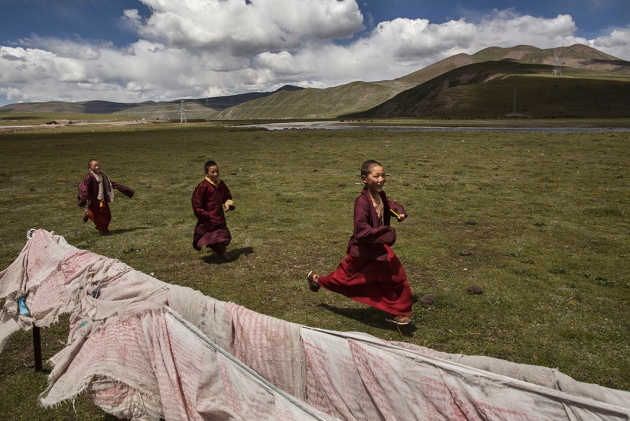

Buddhist monks on the high, cold Tibetan plateau, where humans may have lived year-round for more than 7,000 years.
Intrepid hunter–gatherers may have lived permanently in the cold, harsh environment of the oxygen-starved Tibetan Plateau at least 7,400 years ago — nearly 4,000 years earlier than researchers had thought.
The claim, made by archaeologists who have re-examined ancient hand- and footprints at a site in central Tibet, could shed light on how and why humans moved to live at high altitudes. And it fits with genetic studies suggesting that Tibetan people began to acquire physiological adaptations to help them cope with reduced atmospheric oxygen levels around the same time. But some researchers say the evidence is too scanty to confirm such early year-round habitation on the plateau.
With an average elevation of 4.5 kilometres, the air on the Tibetan Plateau has around half the oxygen present at sea level. “It’s the ultimate test for human survival and adaptation in extreme environments,” says Mark Aldenderfer, an archaeologist at the University of California in Merced, and a co-author of the new study, published on 5 January in Science.
Scientists thought that people began to live there year-round — both in summer and in bitter winter — only about 3,600 years ago, when barley crops that can tolerate frost and cold temperatures were introduced, and farmers moved upland en masse.
But Aldenderfer and colleagues argue that hunter–gatherers lived on the plateau long before agriculture took hold. Their evidence comes from a site called Chusang, northwest of Lhasa, a remote, high-altitude region more than 4 kilometres above sea level. Rocks that were once soft mud near a hot spring there retain impressions of human hand- and footprints, from at least six individuals, including some children. Prehistoric stone tools have been found nearby, and pollen buried in the imprints suggest lush grasslands where wild animals could thrive — food for anyone who made the trek, says Aldenderfer...
Please click and read the full article

86-10-68597521 (day)
86-10-68597289 (night)

86-10-68511095 (day)
86-10-68512458 (night)

cas_en@cas.cn

52 Sanlihe Rd., Xicheng District,
Beijing, China (100864)

